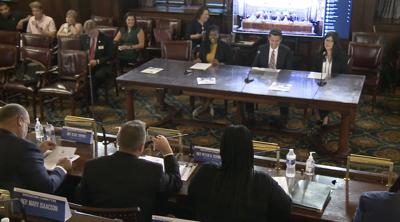HARRISBURG — Afia Lewis sees no shortage of potential among the students in her suburban Philadelphia school, but she told Pennsylvania lawmakers that what is lacking are resources to maximize the academic experience.
Lewis teaches sixth-grade English in William Penn School District in Delaware County. She’s also a senior policy fellow for Teach Plus Pennsylvania, a nonprofit focused on influencing education policy.
The cost of a bus rental alone rules out field trips for her students, according to Lewis. She said there’s little room in the district budget to replace materials for science experiments. When the time comes to update or replace student laptops purchased with one-time federal funding, Lewis doubts the money will be available — at least, not without changes in how Pennsylvania distributes its education subsidies to its 500 public school districts.
“My desks are broken. At the end of the school year last year, I ran out of pencils. It is extremely disruptive,” Lewis told members of the House Education Committee during an informational meeting on Thursday about the Level Up program for poor school districts.
The Commonwealth Court issued a ruling in February that found Pennsylvania’s system for funding public schools is unconstitutional and tasked state legislators to develop a new, equitable system toward easing the local tax burden, especially on taxpayers in poorer districts. Legislative Democrats and Republicans see it as an opportunity to radically change how Pennsylvania funds public education.
For three years running, the Level Up program has been used to funnel additional money to 100 school districts found to be the most underfunded — an attempt at equity. The 2023-24 budget proposal does not have Conneaut, Crawford Central and PENNCREST school districts receiving new Level Up funding.
Last year, $225 million was spread about. This year, that amount was rolled into total school subsidies and the program-specific line item dropped to $100 million for the bottom 100 districts.
Although the funding is included in the budget — one with a $792 million increase for school subsidies, of which $567 million is allocated through a fair funding formula — the General Assembly must finalize legislation authorizing its disbursement.
The Legislature isn’t scheduled for a return to session until late September, weeks after schools reopen, and partisan divides over school funding, the budget process and more could stymy the effort to finalize the required fiscal code bills.
“It breaks my heart that $100 million in Level Up funding that was already appropriated and approved with bipartisan support in both chambers is now in jeopardy,” said Kristen Haase, an English language development teacher at Carter and MacCrae Elementary School in Lancaster and, like Lewis, a Teach Plus Pennsylvania senior policy fellow.
Haase teaches in Lancaster but lives in the more affluent Manheim Township School District where her son is a freshman. The districts are separated by 5 miles but as Haase tells it, the separation is far wider in terms of funding and investment. She expressed particular concern for Lancaster students to whom English is a second language. Current resources aren’t enough to help them achieve fluency, she said.
“The research is clear: My students can be successful but they require additional resources to help them succeed,” Haase said.
Keith Miles, Lancaster School District superintendent, said nearly 9 in 10 students come from economically disadvantaged families. About 1 in 5 speak a foreign language, a rate seven times higher than the average of other nearby public schools, he said.
He said about $6 million in Level Up funds received over the past few years has made a difference but that the local taxing capacity is maxing out.
The district completed renovations of 13 of its buildings over the past 15 years at a combined $240 million, but five more buildings must be brought up to standard, according to Matt Przywara, Lancaster’s assistant superintendent.
Stephen Rodriguez, superintendent of Pottstown School District, echoed those sentiments on facility needs and overburdening the local tax base. The local school board gave a slight tax break recently, he said, but the burden remains heavy.
“We’re still about $80 million behind where the fair funding formula says we ought to be,” Rodriguez said about education subsidies, underscoring the Commonwealth Court’s finding that the system is unconstitutional.
Level Up helped the Pottstown district raise teacher pay and almost reach a full staff complement, the first time in years. Rodriguez said the additional funding helped add to school curricula and programs, aiding elementary students in achieving significant jumps in reading proficiency. And, he said, the graduation rate will climb to the highest levels in years, which he attributed to the extra funding.
“Last year, because of added personnel, we saw a 30 percent reduction in our physical altercations,” Rodriguez said of the district middle school.
“We have been underfunded approximately $11 million to $13 million per year,” he said.


























Commented
Sorry, there are no recent results for popular commented articles.